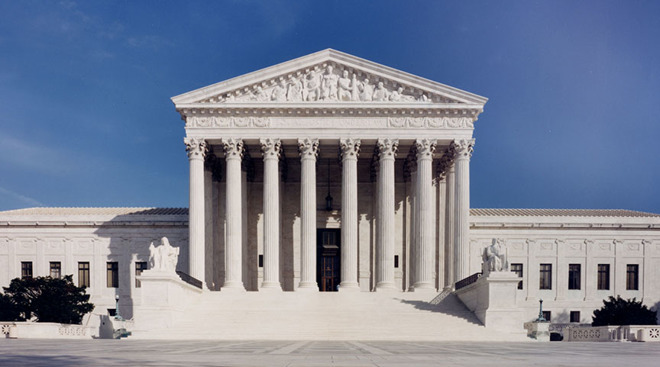The U.S. Supreme Court challenged about Apple's oral arguments concerning accusations the App Store is a monopoly during oral arguments on Monday, with the iPhone producer insisting the antitrust suit should be brought by app developers, rather than consumers.
The hour-long session for the case known as Apple vs. Pepper is about whether or not Apple deliberately created a monopoly with the App Store, which Apple used to increase the prices of apps. The Supreme Court is not settling the issue itself, but is determining whether the case should continue.
According to the suit, it is acknowledged that Apple applies a 30-percent commission on App Store purchases, but in doing so, this forces app developers to increase prices, and in turn forces consumers to pay more for the app or in-app purchase. As Apple is the only provider of an app marketplace that officially works for iOS devices, this allegedly means Apple has a monopoly over app sales, and is able to charge what is perceived to be a high commission that would be lower if there was more competition.
Apple's claims
Apple's oral argument from Daniel Wall effectively relied on the Illinois Brick doctrine, referring to a 1977 legal case that determined only the direct purchaser can levy antitrust accusations in court, with indirect purchasers unable to do so. In that particular ruling, the court feared there would be far-reaching and complex circumstances with a "serious risk of multiple liability for defendants," namely that both Apple and app developers could be sued by a class over the same purchases.
According to Wall, the app developers are Apple's direct customer, as they are "buying a package of services which include distribution and software and intellectual property and testing," with the 30-percent commission. As the commission is agreed beforehand, and developers can set the pricing with knowledge of the fee in mind, Apple argues this sets the pricing with the fee built-in with the developer's wishes, rather than separately.
Ultimately, it is developers who pay the fee, not consumers.
Judicial doubts
Justices Stephen Breyer, Elena Kagan, and Sonia Sotomayor questioned the logic behind the order of purchasing, with Kagan noting that every stage of a consumer's purchase goes though Apple's App Store. "From my perspective, I've just engaged in a one-step transaction with Apple," Kagan suggests.
In other cases where Illinois Brick came into play, it involved a vertical supply chain or concerned whether plaintiffs could request damages for any costs applied in their direction. In this instance, Kagan suggests there may not even be a vertical supply chain at all, which could mean Illinois Brick does not apply.
Sotomayor suggested the situation was different from that of Illinois Brick, which involved a concrete block producer selling goods to contractors that were used in construction for their own customers, with the judge calling the end user "first purchasers."
Justice Breyer posited that Illinois Brick did not impact the case in terms of antitrust, though Wall countered by saying the alleged monopolization over distribution "allegedly first manifests in a 30-percent commission" that the developers pay, and not consumers.
For Justice Samuel Alito and Neil Gorsuch, the two seemed to suggest a reexamination of Illinois Brick may be in order, with Alito noting the "tens of thousands" of app developers who have not filed similar lawsuits against Apple. Gorsuch suggested the possibility of overruling Illinois Brick, citing the fact that some states allow for indirect purchaser lawsuits to proceed without worry of the issues that the doctrine addresses, such as multiple recoveries.
Gorsuch also highlighted that "direct purchasers don't always sue" due to the power of monopolists and the likelihood of profit sharing.
Triple damages?
Arguing on behalf of class suit consumers, lawyer David Frederick insisted there be no need to overrule Illinois Brick, as that case enables direct purchasers to instigate antitrust suits. In this case, Frederick argues users pay Apple, making them direct purchasers, and that "there's no middleman here."
It is also suggested by Frederick that consumers would have different claims against Apple from app developers as while customers would want to recover the difference in price compared with what they would have paid if a competing app market was available, developers would be trying to recover profits.
Alito also queried with Frederick if it was the case consumers would be able to demand damages three times that of the 30-percent commission or if the level would vary between apps. In response, Frederick suggested the tripling of damages is "designed to deter actions just like this," while also suggesting Apple could not accuse another app marketplace of acting in a similar fashion. Frederick's arguments ignored Amazon's Android app store for Kindle devices, however, which functions in a similar manner to Apple's with Amazon's own vendor-locked hardware.
Questions posed by Justices during arguments don't always parallel rulings, however. The questions are generally intended to delve into the truth of the matter, and refine judicial thoughts on what are often arguments with a wide varieties of interpretation.
The Supreme Court may take months to issue a ruling as to whether the suit can continue or end, but the former is likely to be more damaging to both Apple and the rest of the tech industry. Continuing with the suit and losing could open up Apple to further litigation from consumers unhappy with app prices and other elements of the App Store, as well as for other companies like Google and Amazon, who operate their own app markets.
 Malcolm Owen
Malcolm Owen







-m.jpg)








 Charles Martin
Charles Martin


 Mike Wuerthele
Mike Wuerthele
 Christine McKee
Christine McKee



-m.jpg)






55 Comments
To me, this whole case involving the App Store is based on a lack of understanding:
-- If you look at the App Store as simply and strictly and only a market place then, YES! It is a monopoly.
-- If you realize that the App Store provides numerous services critical to well being of Apple, its products and its reputation, then you realize it is NOT a marketplace.
Allowing anybody to install anything on Apple products would make those products no more stable, reliable and secure than a Windows machine. Apple's reputation for reliability, security and privacy depend on the App Store and, without it, both Apple and its developers will suffer immeasurable economic harm. And, we the users will be deprived of a lone island of safety in sea of Googles and Microsofts.
AI's digest is quite good and for another excellent summation from an expert court-watcher:
http://amylhowe.com/2018/11/26/argument-analysis-justices-poised-to-allow-antitrust-dispute-against-apple-over-apps-to-go-forward/
This lawsuit is beyond stupid...
Did the plaintiffs ever buy software before the App Store? Where could they buy an app for $0.99? Prior to the App Store I can’t even remember a commercially available app for a computer for less than $15 not including discounts (even for a less capable one than what can be bought for $0.99 now). Apps nowadays are incredibly cheap, and that’s because of the App Store. The Mac App Store has also made macOS apps cheaper—Apple even reduced the cost of their pro apps significantly.
The idea that Apple has a monopoly on apps in order to raise prices is beyond stupid.
My "favorite" part about the oral arguments was the obsession (primarily by Justice Kagan) on the fact that Apple requires all US App Store prices to end in $.99.
Kagen: "But, in fact, these are all low-cost products for the most part. So saying a price has to end with the -- you know, the -- the number 99 is saying a lot about the fact that you can't charge 77 cents or 55 cents or 32 cents."
Or this nugget by the opposing council: "But, secondly, it's just wrong because if you're constraining what 99 percent of the pricing options are, you know, that -- that's -- it is what it is. But it also has the effect economically of raising the prices."
Really? Before the App Store when was any software sold for $1, let alone 32 cents? The idea that the App Store raised prices, and that making the prices end in .99 made it worse, is absurd. Where are the hoards of developers up at arms about the fact that they can't charge $1.97 or $0.01 or $12.23 for their apps (examples of the "99% of price options" that unavailable)?